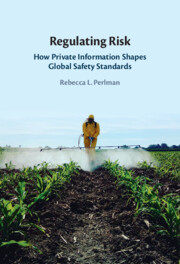Book contents
- Frontmatter
- Contents
- Figures
- Tables
- Acknowledgments
- 1 The Informational Origins of Regulatory Barriers
- 2 Private Information in the Regulation of Risk
- 3 A Theory of Regulatory Barriers
- 4 Seeking Stricter Standards
- 5 How Precaution Begets Bias
- 6 The Internationalization of Bias
- 7 Challenging Barriers
- Statistical Appendix
- Bibliography
- Index
4 - Seeking Stricter Standards
Published online by Cambridge University Press: 23 March 2023
- Frontmatter
- Contents
- Figures
- Tables
- Acknowledgments
- 1 The Informational Origins of Regulatory Barriers
- 2 Private Information in the Regulation of Risk
- 3 A Theory of Regulatory Barriers
- 4 Seeking Stricter Standards
- 5 How Precaution Begets Bias
- 6 The Internationalization of Bias
- 7 Challenging Barriers
- Statistical Appendix
- Bibliography
- Index
Summary
Focusing on firm-level behavior in the US pharmaceutical and agrochemical industries, Chapter 4 provides evidence that companies do indeed seek stricter standards on their own, out-of-patent products in order to boost sales of newer, patented substitutes, even providing negative information about their own products in pursuit of this goal. In order to show this, the chapter leverages petitions submitted by pharmaceutical and agrochemical companies to the US FDA and EPA, respectively, requesting that the agencies place stricter standards or all out bans on products that these companies themselves developed. In the case of the pharmaceutical petitions, the chapter provides evidence that all but one of the requests for a product ban has targeted a drug that is about to lose or has already lost patent protection and for which the company had a more recently patented substitute. This suggests that such requests are not publicly minded attempts to ensure dangerous products remain off the market but, instead, are strategic gambits to boost profits of exclusively produced alternatives. In addition, the chapter provides a statistical analysis of petitions submitted by agrochemical companies and farm groups to show that, whereas farmers are no more likely to seek stricter standards on out-of-patent pesticides, agrochemical companies systematically request stricter standards on these products while requesting more lenient standards on products still enjoying patent protection.
Keywords
- Type
- Chapter
- Information
- Regulating RiskHow Private Information Shapes Global Safety Standards, pp. 74 - 100Publisher: Cambridge University PressPrint publication year: 2023

